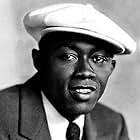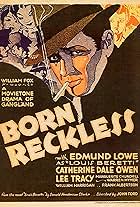The relationship between a male dancer and his actress girlfriend is threatened by a scheming chorister.The relationship between a male dancer and his actress girlfriend is threatened by a scheming chorister.The relationship between a male dancer and his actress girlfriend is threatened by a scheming chorister.
- Awards
- 1 win total
Storyline
Did you know
- TriviaMae Clarke's film debut.
- ConnectionsReferenced in Lee Tracy: The Fastest Mouth in the West (2022)
- SoundtracksNobody Knows You Like I Do
Words and Music by Sidney Lanfield
Copyright 1929 by De Sylva, Brown and Henderson Inc.
Featured review
BIG TIME (Fox, 1929), directed by Kenneth Hawks, marked the movie debuts of both Lee Tracy and Mae Clarke. A sort of predecessor to the now classic and familiar story to A STAR IS BORN (1937 and 1954), Tracy plays Eddie Burns, a self-centered vaudevillian comic who is teamed up with Lily Clark (Mae Clarke), a singer and dancer who hopes on making it someday to the big time. The couple marry, but their marriage soon falls apart when Lily rises to fame, later as a motion picture star, while Eddie declines and struggles in the background.
This rarely seen early talkie is typical rise and fall show-biz story of the time, but somehow entertains in spite of predicable plot. Mae Clarke comes off best in a rare leading performance, especially when she gets on center stage under the spotlight by singing a sentimental ditty titled "Nobody Knows You Like I Do" (written by Sidney Lansfield). Sadly, Clarke's career would soon diminish by the end of the 1930s with either leads in "poverty row" productions or minor supporting or bit parts in major films. If remembered at all today, she is the one best known as the girl named Kitty who gets the grapefruit pushed into her face by the tough James Cagney in that famous scene in THE PUBLIC ENEMY (WB, 1931). Clarke and Tracy would be re-teamed again in another rarely seen gem titled TURN BACK THE CLOCK (MGM, 1933), which can be seen on Turner Classic Movies.
BIG TIME also features Josephine Dunn as Gloria, the other woman who comes between Eddie and Lily (Tracy and Clarke); Stepin Fetchit as Eli; and Daphne Pollard adding some comic wisecracks as best friend Sybil. John Ford appears in a cameo role as the movie director, along with character actor Dewey Robinson as a barman, but I'm not sure exactly who that child actor is who plays Eddie Burns Jr., a boy trooper and dancer, who makes his appearance near the end of the story.
A movie like this might not ever get to make its way to television these days, but I was fortunate to have viewed this one in 1979 at New York City's Museum of Modern Art's film department as part of its series tribute to the old Fox Film studios. In spite of its age, it's quite entertaining. (**)
This rarely seen early talkie is typical rise and fall show-biz story of the time, but somehow entertains in spite of predicable plot. Mae Clarke comes off best in a rare leading performance, especially when she gets on center stage under the spotlight by singing a sentimental ditty titled "Nobody Knows You Like I Do" (written by Sidney Lansfield). Sadly, Clarke's career would soon diminish by the end of the 1930s with either leads in "poverty row" productions or minor supporting or bit parts in major films. If remembered at all today, she is the one best known as the girl named Kitty who gets the grapefruit pushed into her face by the tough James Cagney in that famous scene in THE PUBLIC ENEMY (WB, 1931). Clarke and Tracy would be re-teamed again in another rarely seen gem titled TURN BACK THE CLOCK (MGM, 1933), which can be seen on Turner Classic Movies.
BIG TIME also features Josephine Dunn as Gloria, the other woman who comes between Eddie and Lily (Tracy and Clarke); Stepin Fetchit as Eli; and Daphne Pollard adding some comic wisecracks as best friend Sybil. John Ford appears in a cameo role as the movie director, along with character actor Dewey Robinson as a barman, but I'm not sure exactly who that child actor is who plays Eddie Burns Jr., a boy trooper and dancer, who makes his appearance near the end of the story.
A movie like this might not ever get to make its way to television these days, but I was fortunate to have viewed this one in 1979 at New York City's Museum of Modern Art's film department as part of its series tribute to the old Fox Film studios. In spite of its age, it's quite entertaining. (**)
Details
- Runtime1 hour 27 minutes
- Color
- Aspect ratio
- 1.20 : 1
Contribute to this page
Suggest an edit or add missing content


















